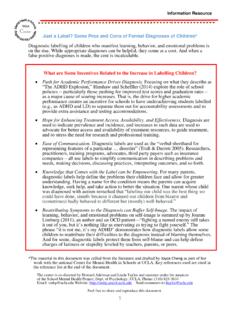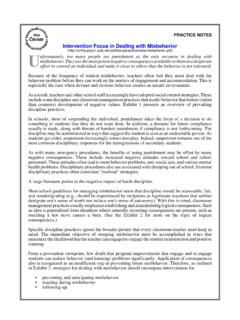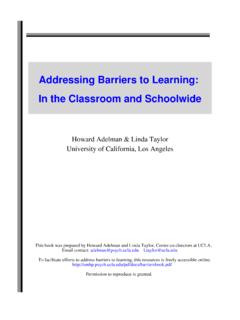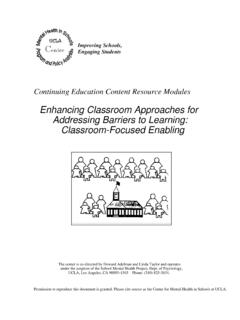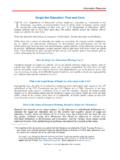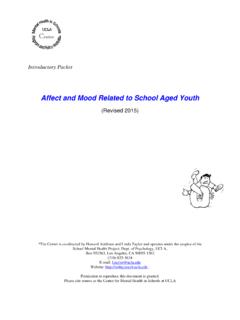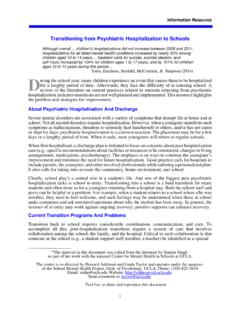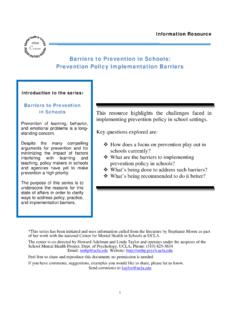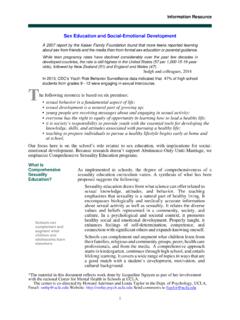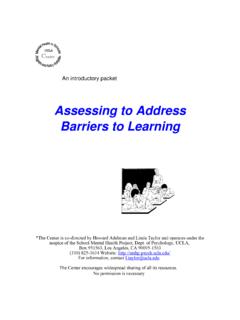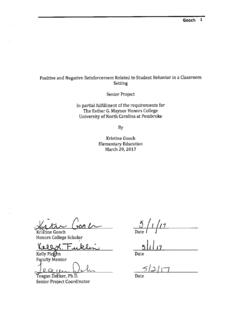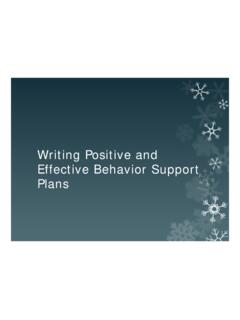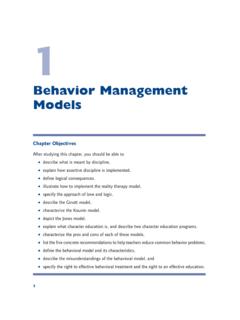Transcription of School-wide Discipline, Behavior Management, and Student ...
1 School-wide Discipline, Behavior management , Student Self- management , Page 1 and Social Skills Instruction and Selection School-wide Discipline, Behavior management , and Student Self- management : Focusing on Social Skills Instruction and Selecting an Evidence-based Social Skills Program A State Personnel Development Grant Technical Assistance Report1, 2, 3 Arkansas Department of Education Little Rock, Arkansas October, 2009 Background Research has consistently identified a number of critical factors as being most highly correlated with academic achievement ( , Berliner, 1988; Cawalti, 1995; Wang, Haertel, & Walberg, 1993-1994; Ysseldyke & Christenson, 2002). These factors include: 1. A positive classroom climate that is conducive to learning, 2. A peer culture that is supportive of academic achievement, 3. The use of cooperative learning strategies complemented by positive and productive Student and teacher interactions, 4.
2 Effective classroom management , 5. High levels of academic engaged time coupled with a high percentage of teacher time focused on instruction, and 6. Teaching students to understanding of the underlying processes of what they are learning (metacognitive understanding). In reviewing this list, it becomes clear that positive school and classroom climates; teachers classroom management skills; students interpersonal, social problem solving, conflict resolution, and coping skills; and a School-wide system that encourages Student accountability and self- 1 Citation for this Document: Arkansas Department of Education, State Personnel Development Grant. (2009, October). School-wide Discipline, Behavior management , and Student Self- management : Focusing on Social Skills Instruction and Selecting an Evidence-based Social Skills Program. Little Rock, AR: Author.
3 2 Primary Authors: Dr. Howard M. Knoff, Lisa Johnson, Dr. Randall Glenn, Lisa Haley, and Loretta Wallace 3 Much of the content of this technical assistance report, and all of the tables and graphics have been previously copywritten by Project ACHIEVE Press, 2007, 2009. School-wide Discipline, Behavior management , Student Self- management , Page 2 and Social Skills Instruction and Selection management significantly contribute to the overall learning environment. These factors contribute to and enhance students on-task Behavior and academic engagement and, relatedly, their academic achievement and success. Focusing especially on school climate and students social, emotional, and behavioral skills, the Collaborative for Academic, Social, and Emotional Learning (CASEL, 2002) has noted that: Improving the social and emotional climate of schools, and the social and emotional soundness of students, advances the academic mission of the schools in important the social and emotional needs of students does more than prepare them to learn.
4 It actually increases their capacity to learn. (p. 10) This sentiment has been echoed by others (Fraser, 1991; Goodenow & Grady, 1993; McNeely, Nonemaker, & Blum, 2002) who have emphasized that students progress in school occurs most often in classrooms where students feel connected, supported, and interpersonally close to their teachers and peers. All of this points to the need for and importance of School-wide positive behavioral Support Systems (Knoff, 2007, and other references at end of paper). Significantly, when schools teach and reinforce positive and appropriate interpersonal, problem solving, conflict resolution, and coping skills, and students demonstrate these skills, teachers and students are more engaged in academic instruction, and incidents of teasing, taunting, bullying, harassment, aggression, apathy, defiance, and intolerance decrease. This paper first discusses the evidence-based components of positive behavioral Support Systems, including the characteristics of effective social skills programs.
5 It then describes how to teach social skills in the classroom, and reviews eight notable research-based social skills School-wide Discipline, Behavior management , Student Self- management , Page 3 and Social Skills Instruction and Selection programs. The paper concludes with recommendations on ways for districts to select a social skills program for use across all of its schools. An Evidence-Based Blueprint for positive behavioral Support System Success From the small number of School-wide positive behavioral Support Systems (PBSSs) available nationally, the Arkansas Department of Education has chosen to use an explicit PBSS blueprint as part of its State Improvement Grant for the past six years (Knoff, 2002). This blueprint includes six interdependent components across the three intervention tiers: prevention (Tier 1), strategic intervention (Tier 2), and intensive/crisis management services (Tier 3; see figure below).
6 The key components embrace the need for Student (a) Skills social skills instruction for all students; (b) Accountability the establishment of building-wide accountability processes; and (c) Consistency staff and administrative consistency. The next two blueprint components include (d) Special Situations Analyses a special situations focus on Student Behavior in the common areas of a school and relative to teasing, taunting, bullying, harassment, and physical aggression; and (e) Crisis Prevention, Intervention, and Response strategic or intensive interventions for the more challenging or challenged students who are not responding to the more preventive approaches, along with school-based crisis intervention and response strategies and approaches as needed. The last component, (f) Community and Family Outreach, includes planned outreach activities to involve or train parents and other relevant community agency and support system stakeholders in the other five components, encouraging them to reinforce these components activities and processes in their respective settings.
7 School-wide Discipline, Behavior management , Student Self- management , Page 4 and Social Skills Instruction and Selection Project ACHIEVE sPositive behavioral Self- management System (PBSS) BlueprintSkillPreventionAccountabilityCo nsistencyStra te gic Inte rve ntionSpecial SituationAnalysesIntensive Need/Crisis ManagementCrisis Prevention, Intervention, and ResponseCommunity and Family Outreach Most of these six PBSS components are guided by the School Discipline Committee. At times, however, this committee may collaborate with other school-level committees to accomplish specific goals. Below, each of these PBSS components is described in greater detail. Social Skills Instruction. The ultimate goal of a social skills program is to teach students needed interpersonal, social problem-solving, conflict resolution, coping and self-control, and academic support (self- management ) skills and how to use them during actual peer and adult interactions (Knoff, 2001).
8 In general, students with good social skills contribute to positive and safe classroom and school settings, and they are unlikely to engage in inappropriate behaviors. School-wide Discipline, Behavior management , Student Self- management , Page 5 and Social Skills Instruction and Selection Relative to research and practice, an effective social skills program: 1. Is based on a social learning theory model that uses teaching, modeling, role-playing, providing performance feedback, and an active focus on the transfer of training across time, setting, people, places, and circumstances for instruction; 2. Uses a core (universal) language that facilitates cognitive behavioral scripting and mediation, and conditions self-control and self-managed Behavior ; 3. I s explicit and developmentally appropriate, yet flexible and adaptive to students individual communication skills, cultures, maturational levels, and needs; 4.
9 Provides a defined, progressive, yet flexible, sequence of behaviors that recognizes that some prerequisite skills must be mastered before more complex skills are introduced; 5. Employs an evidence-based pedagogical approach to instruction that sequences instruction, application, and teachable moments; 6. Was designed for implementation by regular classroom teachers as the primary instructors; and 7. Has been demonstrated to be acceptable, socially valid, and easy to implement thereby facilitating implementation integrity (see figure below for more characteristics of effective social skills programs). While many social skills curricula have been marketed, very few have been designated as evidence-based. An evidence-based program is one that has (a) demonstrated consistent positive , data-based effects across multiple settings, students, circumstances, implementations, and implementers; (b) demonstrated its effectiveness under controlled and/or comparison School-wide Discipline, Behavior management , Student Self- management , Page 6 and Social Skills Instruction and Selection conditions; and (c) been externally and independently evaluated by peer experts, usually convened by a federal agency or its designee.
10 In contrast, a research-based program may be based on previously published research or theory, but it has not demonstrated consistent and pervasive Student -related outcomes, nor been independently reviewed and evaluated. THE EVIDENCE-BASED CHARACTERISTICS OF AN EFFECTIVE SOCIAL SKILLS PROGRAM1. The social skills program is evidence-based. It has been empiricallydemonstrated to be effective in controlled and independent studies in real schools and school situations--and independently evaluated as The social skills program connects the skill training with students to a building-and grade-level positive behavioral Support System (PBSS) that includes a focus on Student accountability, staff and Student consistency, common area and peer interactions, crisis prevention, and community and parent outreach and The social skills and PBSS components have evaluation components that assess treatment and implementation integrity; as well as relevant Student , staff, and school outcomes.
